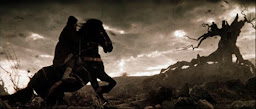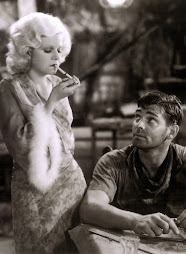Prince Caspian is a summer book, a library book meant to be read in the back seat of your mom's station wagon, windows down, wearing shorts, on your way to the pool, or a forest where you'll splash crawfish in the creek and fight knights with wooden swords, homemade. It's a book that's in a pile next to your bed with Song of Roland and The Egypt Game and a picture book of Greek myths. Prince Caspian is another trip to Narnia, this time all sun and sand and full green forests and warriors in armor and broadsword fights. It's another chance to stay in Narnia forever, even if it only lasts a few hundred pages, that forever of sun-gleamed shields and a golden-maned Aslan, and trees -- trees in a glade, trees that dance and arch their branches into a wild forest cathedral, trees that catch the sunlight and the starlight and make that world into a holy place.
It's my summer book, my summer holiday book, just as the Pevensies get set to return to school, they, and I, we all get pinched and pulled away to a war and a wilderness and woods where Aslan waits for us to finally believe and see him. When I read Prince Caspian, I find I never want to leave Narnia. When I read any of the Chronicles, in fact, I find I never want to leave Narnia. Perhaps that's why we're lucky to have seven books, and why Lewis promised that even the end of his books was only the beginning of the story. That is the one great function of fairy stories, to show us the world of Faerie and stir in us a desire to dwell in that place forever. It's the desire for heaven, enchanted with the trappings of fauns and dwarves and broadswords.
For all the wailing of infidelity and smug denunciations that have come out against the Prince Caspian movie, I myself cannot shake the unmistakably familiar feeling I get whenever I watch either of these two latest adaptations: I find I never want to leave Narnia. Whatever its faults as an adaptation of Lewis's work, whatever its thematic poverty (according to the nitpickers, at least), the Narnia movies affect in me that same longing, that same desire I get from reading the books: I want to stay in Narnia forever.
Patronizing as I'm sure it will sound, I actually feel bad for those who reacted to Prince Caspian with disgust. They are so attached to "the word" of Lewis that they end up missing the beauty and power of the images. It was Lewis himself who said he conceived of the Narnia stories as images in his head which he then fashioned stories around. And what are movies if not images come to life, animated with movement and music, and the flesh and breathe and voice of real people inhabiting our favorite characters.
Yes, the movie leaves things out, it even dares to change things. We don't get to see the part where Dr. Cornelius tells Caspian all the tales of Old Narnia -- but what we do get is the round, twinkling face of the old tutor that betrays the perfect hint of his dwarvish mother. What we do get is the thrill and magic of the moment when Caspian stands before the Old Narnians on the Dancing Lawn and pledges to restore Narnia to them.
We don't get the scene where each of the children finally comes to see Aslan as they each in turn come to believe he is there. But instead we get a beautiful scene of a contemplative Peter, sitting at the foot of the broken Stone Table and silently praying before the image of Aslan, a moment of Adoration almost, in which we know from his sad, meditative face that he has finally realized the sin of his unbelief and is begging for Aslan's forgiveness and help. We get the simple profundity of the moment when Edmund, Peter, Caspian, and Susan finally come face to face with the great lion and they fall to their knees in homage and repentance.
I've read criticism from Christians who say Aslan is just a "magic lion" in these movies, that he's really no different than any of the other animals, only kinda, sorta "more powerful." I can't understand such impressions, not when I've seen the golden mane of Aslan in the forest, the trees parting in the glade to reveal him in all his majesty to Lucy as she seeks him with her simple faith. "Just a dream"? To paraphrase Albus Dumbledore, just because it's happening in her head doesn't mean it's not real. I can't understand the idea that Aslan is just a cuddly creature who roars occassionally, not when his roar is so terrifying, so utterly wild and fierce and dangerous, that I wonder for a moment how he might ever speak in Liam Neeson's dulcet tones again.
The Narnia movie nitpickers have, sadly, missed the forest for the dryads in their criticisms of Prince Caspian. Could more of Lewis's themes have remained intact? Certainly. But very, very few adaptations maintain all of a book's themes when going from page to screen, so why scold Caspian so relentlessly? I left the movie wanting to be a better Christian. The film reminded me of a favorite homily topic of one of my favorite priests: In our lives, whose will are we really following, God's or our own? Caspian reawakened in me the awareness that it must always be God's will that I follow, that thinking I can do it alone leads to nothing.
But yes, let's savage the film because the themes weren't subtle enough, because the breadth of Lewis's theological thinking wasn't explored with enough depth. Nevermind that the film stirred my heart (and I'm sure others') toward virtue, or that it filled me with the same longing and joy that I get from reading the books. Nevermind the beautiful and profound images: the catacomb of the Stone Table; Trumpkin kneeling before the roar of Aslan; the four kings and queens standing amongst the ruins of Cair Paravel; the werewolf and the hag tempting Caspian into evil; Aslan breathing on the Telemarines before they go through the door in the air; Peter and Susan walking with Aslan as he tells them they cannot return to Narnia -- that private conversation we never hear, yet we know from their faces the seriousness, the sadness of that conversation, and the spiritual maturity the eldest siblings have achieved to be able to have had such a talk with the lion. Nevermind all that, I guess, since the filmmakers didn't hammer the anti-Enlightenment theme hard enough for the critics. I guess Miraz calling the Narnians a superstition and Cornelius saying he was "forbade to mention the old tales" wasn't enough for them, nor was Trumpkin's calling Aslan "someone who doesn't exist." I find it funny and ironic, as well, that so many critics are decrying the violence in the film, because the exact same criticisms were (and continue to be) lobbed at the books. Many argued that the books glorified violence and were far too violent to be "Christian," and yet Lewis responded that he was no pacifist, and that the books are violent because life is violent and full of evils that need to be fought and we should not shield children from this fact.
For my part, though, the nitpickers can keep picking their nits in resentment while I bask in the grace of the golden CGI lion and pledge my sword to Ben Barnes's Caspian.
Now the weather gets warmer, the trees fill with green, and soon it's summer. The summer story -- Prince Caspian -- waits at the side of my bed to be opened and enjoyed again, to be read underneath a tree or on a playground swing. And now it's also waiting for me in the darkened theater, the film's summer sun pierces light through those shadows and takes me to a place I never want to leave, to Narnia and to Aslan.
This sticker is dangerous and inconvenient but I do love Fig Newtons
Subscribe to:
Post Comments (Atom)












_01.jpg)







No comments:
Post a Comment